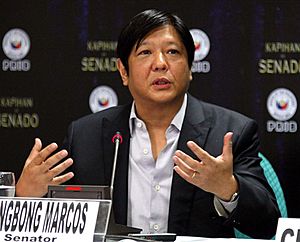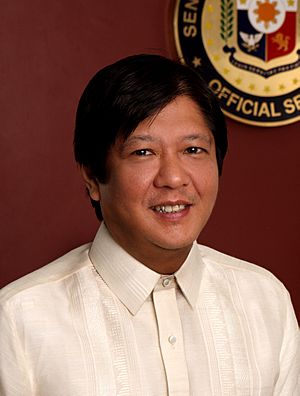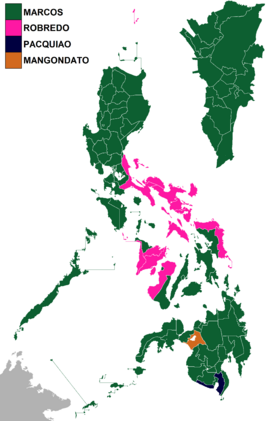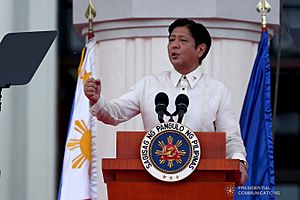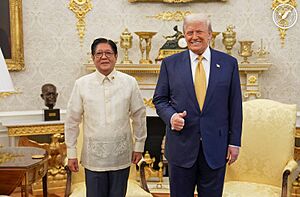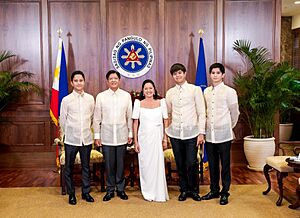Bongbong Marcos facts for kids
Quick facts for kids
Bongbong Marcos
|
|
|---|---|
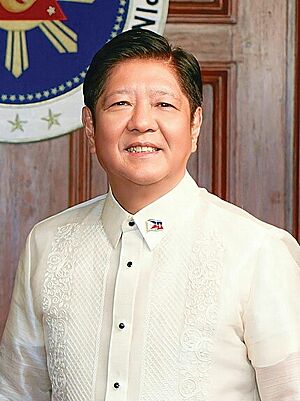
Official portrait, 2023
|
|
| 17th President of the Philippines | |
| Assumed office June 30, 2022 |
|
| Vice President | Sara Duterte |
| Preceded by | Rodrigo Duterte |
| Secretary of Agriculture | |
| In office June 30, 2022 – November 3, 2023 |
|
| President | Himself |
| Preceded by | William Dar |
| Succeeded by | Francisco Tiu Laurel Jr. |
| Senator of the Philippines | |
| In office June 30, 2010 – June 30, 2016 |
|
| Member of the Philippine House of Representatives from Ilocos Norte's 2nd district | |
| In office June 30, 2007 – June 30, 2010 |
|
| Preceded by | Imee Marcos |
| Succeeded by | Imelda Marcos |
| In office June 30, 1992 – June 30, 1995 |
|
| Preceded by | Mariano Nalupta Jr. |
| Succeeded by | Simeon Valdez |
| 19th Governor of Ilocos Norte | |
| In office June 30, 1998 – June 30, 2007 |
|
| Preceded by | Rodolfo Fariñas |
| Succeeded by | Michael Marcos Keon |
| In office March 23, 1983 – February 25, 1986 |
|
| Preceded by | Elizabeth Keon |
| Succeeded by | Castor Raval (OIC) |
| Vice Governor of Ilocos Norte | |
| In office June 30, 1980 – March 23, 1983 |
|
| Governor | Elizabeth Keon |
| Preceded by | Antonio Lazo |
| Chairman of Partido Federal ng Pilipinas | |
| Assumed office October 5, 2021 |
|
| President | Reynaldo Tamayo Jr. |
| Preceded by | Abubakar Mangelen |
| Personal details | |
| Born |
Ferdinand Romualdez Marcos Jr.
September 13, 1957 Santa Mesa, Manila, Philippines |
| Political party | PFP (2021–present) |
| Other political affiliations |
Nacionalista (2009–2021) KBL (1978–2009) |
| Spouse |
Louise Araneta
(m. 1993) |
| Children | 3, including Sandro |
| Parents |
|
| Relatives | Marcos family |
| Residences | |
| Alma mater |
|
| Signature |  |
Ferdinand "Bongbong" Romualdez Marcos Jr. (born September 13, 1957), also known as BBM or PBBM, is a Filipino politician. He became the 17th president of the Philippines in 2022. He is the son of the 10th president, Ferdinand Marcos, and former first lady, Imelda Marcos.
Marcos began his political career in 1980 as the vice governor of Ilocos Norte. At that time, his father was ruling the Philippines under martial law. He became governor in 1983. His family left the country in 1986 after the People Power Revolution.
After his father's death in 1989, President Corazon Aquino allowed the Marcos family to return to the Philippines. Bongbong Marcos was then elected to several political positions. He served as a representative for Ilocos Norte, a governor, and a senator.
In 2022, Marcos ran for president and won with a large number of votes. His campaign focused on a message of unity. However, some people criticized his campaign for its views on history, especially about his father's time as president. In 2024, Time magazine named him one of the 100 most influential people in the world.
Contents
Early Life and Education
Bongbong Marcos was born on September 13, 1957, in Santa Mesa, Manila. His parents were Ferdinand Marcos and Imelda Marcos. When he was born, his father was a representative in the Philippine government. Two years later, his father became a senator.
Schooling in the Philippines and England
Marcos attended kindergarten and elementary school in the Philippines. He studied at Saint Pedro Poveda College and La Salle Green Hills.
In 1970, he was sent to England to study at Worth School, a school for boys. While he was there, his father declared martial law in the Philippines in 1972.
University Studies
Marcos later attended St Edmund Hall, Oxford. He received a special diploma in social studies. He also enrolled in a master's program at the Wharton School of Business in the United States but did not finish. He said he left the program to become the Vice Governor of Ilocos Norte in 1980.
Early Public Roles
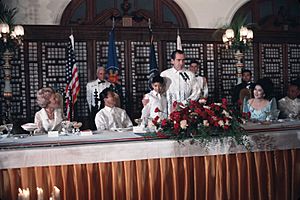
Marcos was in the public eye from a young age. This was especially true when his father ran for president in 1965.
When he was eight years old, he appeared in a movie about his father's life called Iginuhit ng Tadhana (The Ferdinand E. Marcos Story). In the film, he said he wanted to be a politician when he grew up. The movie helped his father win the presidential election.
Political Career
Marcos has held many different political jobs over the years. He started his career in his family's home province of Ilocos Norte.
Governor of Ilocos Norte
Marcos's first political job was as Vice Governor of Ilocos Norte from 1980 to 1983. He was 22 years old when he was elected.
On March 23, 1983, he became the Governor of Ilocos Norte. He held this position until his family left the Philippines in 1986. He was elected governor again in 1998 and served for three terms until 2007.
Return to the Philippines
After the People Power Revolution in 1986, the Marcos family lived in Hawaii. After his father died in 1989, the family was allowed to return to the Philippines in the early 1990s. Bongbong Marcos returned in 1991 and soon started his political career again.
House of Representatives
Marcos was elected as a representative for the second district of Ilocos Norte from 1992 to 1995. During this time, he helped create the Department of Energy and the National Youth Commission.
He was elected to the House of Representatives again in 2007 and served until 2010. During this term, he supported laws about the country's sea boundaries and access to affordable medicine.
Senate Career
In 2010, Marcos was elected to the Senate of the Philippines. He served one six-year term. As a senator, he wrote and supported many laws. These included laws about road safety, cybercrime, and health insurance.
He was the chairman of several Senate committees. These committees focused on topics like housing, local government, and public works.
2016 Vice Presidential Campaign
In 2015, Marcos announced he would run for Vice President of the Philippines in the 2016 election. He ran alongside presidential candidate Miriam Defensor Santiago.
The election was very close. Marcos lost to Leni Robredo by a small number of votes. He questioned the results, but the Presidential Electoral Tribunal later confirmed Robredo's victory.
2022 Presidential Campaign
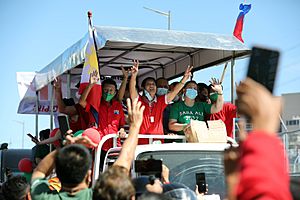
Marcos announced his run for president on October 5, 2021. His running mate was Sara Duterte, the daughter of then-President Rodrigo Duterte. Their team was called the "UniTeam".
His campaign focused on the theme of unity. He led in many surveys before the election. He chose not to attend most of the presidential debates, which some people criticized.
Marcos won the election on May 25, 2022, with over 31 million votes. This was about 58.77% of the total votes. It was the first time a presidential candidate had won by a majority since 1986. His victory marked the return of the Marcos family to power after 36 years.
Presidency (2022–present)
Marcos became the 17th President of the Philippines on June 30, 2022. His inauguration took place at the National Museum of the Philippines.
First Actions as President
One of his first actions was to also serve as the Secretary of Agriculture. He did this to focus on food prices and farming. He also signed an order to give students free rides on some trains.
He reviewed a list of families receiving government aid. This was to make sure only qualified people were getting help. He also made decisions on several new laws, approving some and vetoing others.
Domestic Policy

As president, Marcos focused on several key areas within the country.
Agriculture
Marcos launched programs to help farmers and lower food prices. He expanded the Kadiwa Project, which sells fresh local food at lower prices. In July 2023, he signed the New Agrarian Emancipation Act. This law forgave the debts of over 600,000 farmers. After more than a year, he appointed Francisco Tiu Laurel Jr. as the new Secretary of Agriculture.
Defense
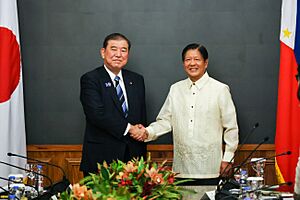
Marcos has worked to improve the country's defense. He continued the AFP Modernization Program to buy new equipment for the military. He also announced plans for the Philippines to get its first submarine.
His government approved more U.S. military access to Philippine bases under the Enhanced Defense Cooperation Agreement. This is meant to improve the country's security.
Education
Marcos and Vice President Sara Duterte, who is also the Education Secretary, reopened schools for in-person classes in August 2022. He also started a review of the K–12 education program. He wants to improve science and technology education in schools.
Economy
The Marcos administration has focused on growing the economy after the COVID-19 pandemic. The goal is to lower poverty and manage the country's debt. His government has also supported creating more economic zones to attract businesses.
Foreign Policy
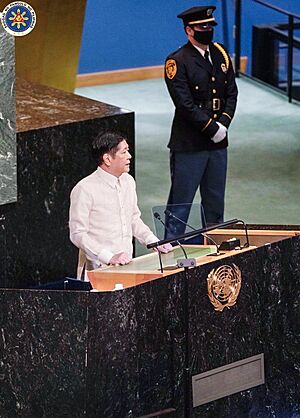
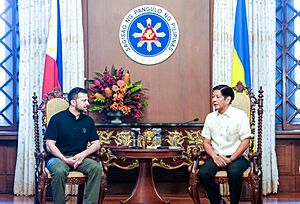
President Marcos has said his foreign policy is to be "friends to all, enemies to none." He has worked to strengthen relationships with countries like the United States, Japan, and Australia.
He has been firm about protecting Philippine territory. He promised not to give up "even one-square inch" of land to any foreign power. This has led to increased tensions with China over disputes in the South China Sea.
Personal Life
Marcos is married to lawyer Louise "Liza" Cacho Araneta. They married in Italy on April 17, 1993. They have three sons: Sandro, Simon, and Vinny.
Marcos enjoys listening to rock and roll music. He is a fan of the Beatles. He also plays the saxophone. He likes to exercise, read books, and watch movies. He is also a fan of Formula One racing.
See also
 In Spanish: Ferdinand Marcos y Romuáldez para niños
In Spanish: Ferdinand Marcos y Romuáldez para niños
 | Delilah Pierce |
 | Gordon Parks |
 | Augusta Savage |
 | Charles Ethan Porter |


